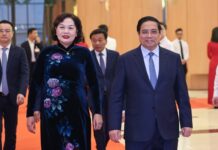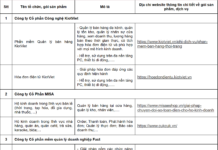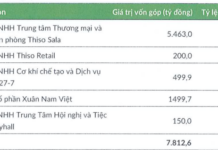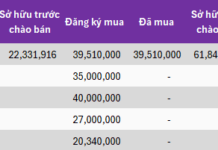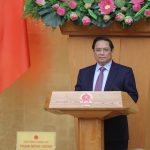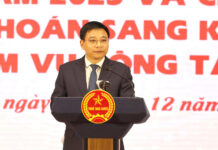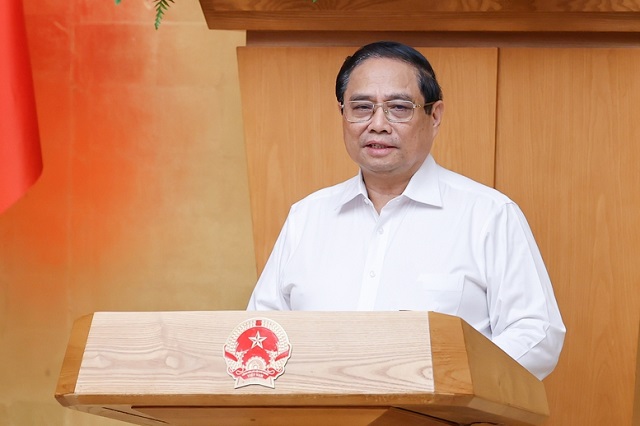
Prime Minister Pham Minh Chinh concludes the Government’s thematic meeting on law building – Photo: VGP/Nhat Bac
|
On August 27, Prime Minister Pham Minh Chinh chaired the Government’s thematic meeting on law building, discussing and providing opinions on three draft laws: The Law on Management and Investment of State Capital in Enterprises (amended); The Law on Teachers; and The Law on Digital Technology Industry.
This is the second thematic law meeting in August 2024 and the eighth of its kind held by the Government this year. The meeting was attended by Deputy Prime Ministers, ministers, and heads of ministerial agencies.
At the meeting, the Government listened to the presentation of the summary report and the report on the absorption of appraisal opinions. They also discussed key policies in the draft laws.
Regarding the draft Law on Management and Investment of State Capital in Enterprises (led by the Ministry of Finance), the Government members discussed the scope of adjustment, subjects of application, regulations related to the transfer of the Development Investment Fund, inspection and supervision, state management functions, and state ownership representation.
For the draft Law on Teachers (led by the Ministry of Education and Training), the Government agreed on the need to continue improving the relevant provisions related to teachers. They will inherit the provisions that have been proven effective in practice, while supplementing new provisions to address practical shortcomings and obstacles.
On the draft Law on the Digital Technology Industry (led by the Ministry of Information and Communications), the delegates focused on providing opinions on several contents, including mechanisms for large-scale special projects, approval authority for controlled trials, the relationship between the draft law and related laws, and artificial intelligence management.
Mobilizing All Legal Resources for National Development
Prime Minister Pham Minh Chinh gave specific opinions on each discussed content and emphasized additional perspectives on the development of the draft laws.
Regarding the general perspective, the Prime Minister requested to closely follow and institutionalize the Party and State’s guidelines, policies, and orientations on relevant issues. He also emphasized the need to reflect the policies approved by the Government in the proposal to build these laws.
Along with this, there should be a continued innovation in law-making thinking, focusing on practicality and respecting objective reality. Issues that are mature, clear, and proven effective in practice should be legalized. For issues that are not yet clear, pilot implementations should be carried out to gradually gain experience. It is important to avoid being overly meticulous or hasty and to focus on resolving practical difficulties, obstacles, and inconsistencies.
There should also be a strong emphasis on decentralization and empowerment, along with the allocation of resources and enhancement of implementation capacity. Additionally, tools for monitoring, inspection, and control of power should be designed, with a focus on post-inspection. Clear assignments regarding individuals, tasks, responsibilities, and products should be established, and administrative procedures should be simplified to eliminate red tape and reduce intermediary steps.
State agencies should concentrate on performing state management tasks, including strategy, planning, policy formulation, legal framework, standards, criteria, and tools for monitoring and inspection. They should also conduct preliminary and final reviews and handle commendations and disciplines.
There should be strong coordination and efficiency among ministries, sectors, and agencies. Incentive mechanisms should be in place for areas that need encouragement, and international experience should be referenced, taking into account Vietnam’s conditions, circumstances, and the economy’s ability to pay.
“The mechanism and policies must be open and feasible but controllable. They should include appropriate and effective policies for training and fostering high-quality human resources related to the three areas covered by the draft laws. We must mobilize all legal resources for the country’s development,” the Prime Minister stated.
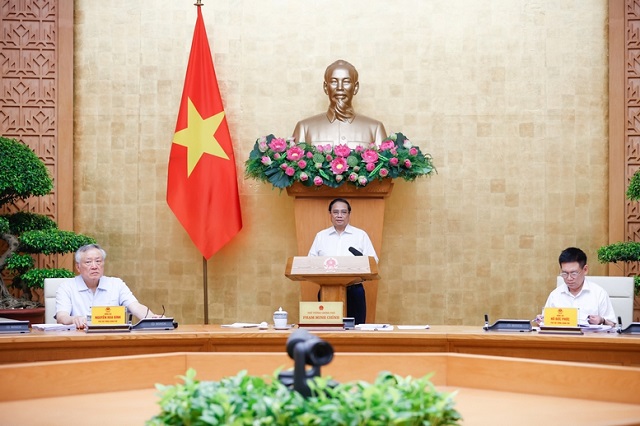
Prime Minister Pham Minh Chinh analyzes and emphasizes additional perspectives on the development of the draft laws – Photo: VGP/Nhat Bac
|
Regarding the draft Law on Management and Investment of State Capital in Enterprises, the Prime Minister requested to closely follow and institutionalize the contents of Resolution No. 12-NQ/TW of the 12th Central Committee on continuing to restructure, renew, and improve the efficiency of state-owned enterprises. The prime minister emphasized putting the common interests, national interests, and the interests of the people first.
It is necessary to review and address practical shortcomings and obstacles, inheriting the effective provisions of the current law and ensuring consistency with related legal documents, such as the Law on Investment, Law on Public Investment, Law on Enterprises, and Law on Construction.
The Prime Minister also suggested focusing on management by objectives, with stronger decentralization and empowerment for enterprises, along with appropriate resource allocation. This should be coupled with enhanced implementation capacity and the design of inspection and monitoring tools, reducing administrative procedures for enterprises and eliminating red tape. By doing so, we can promote dynamism, creativity, and a daring spirit for the common good, while ensuring the legitimate rights and interests of laborers.
Consequently, we can improve investment efficiency and maximize the enormous resources in enterprises. This will also enhance the pioneering role of state-owned enterprises in certain fields and their overall importance to the economy, as well as the dominant role of the state economy.
Regarding the draft Law on the Digital Technology Industry, the Prime Minister advised continuing to closely follow and institutionalize the Party’s orientations in Resolution No. 19-NQ/TW of the 13th Central Committee and Plan No. 13-KH/TW of the Politburo on continuing to promote industrialization and modernization until 2030, with a vision towards 2045. It is also essential to refer to Resolution No. 52-NQ/TW dated September 27, 2019, of the Politburo on actively participating in the Fourth Industrial Revolution and Resolution No. 23-NQ/TW dated March 22, 2018, of the Politburo on directing the policy for developing the national industry until 2030, with a vision towards 2045.
Regarding the draft Law on Teachers, the Prime Minister emphasized the need to improve the quality of the teaching staff, meeting the requirements, tasks, and mission of educating the next generation. He conveyed the perspective that “teachers are the driving force and inspiration for students.”
In conclusion, Prime Minister Pham Minh Chinh appreciated the efforts and active contributions of the Ministries of Finance, Education and Training, and Information and Communications in preparing and presenting the contents. He also acknowledged their serious reception and explanation of the opinions of the Government members, resulting in the refinement and completion of the draft laws. The Prime Minister valued the heartfelt and responsible opinions of the Government members and delegates, which were closely connected to reality and of high quality.
The Prime Minister requested that the ministers seriously and comprehensively absorb the valid opinions to perfect the draft laws according to the Law on the Promulgation of Legal Documents and related regulations. These laws are expected to be submitted to the National Assembly at the 8th session in October 2024.
Given the complexity and novelty of these laws, the Prime Minister asked the ministers to establish task forces with the participation of experts and personnel from other ministries, sectors, and agencies. He emphasized the importance of continuing to listen to experts, scientists, and affected parties, as well as coordinating closely with the National Assembly’s agencies. Effective communication and the involvement of the assigned Deputy Prime Ministers are crucial to ensuring progress and enhancing the quality of the draft laws.
The 7th session of the National Assembly opens on 20 May
Continuing the 32nd session program, on the afternoon of April 17, the National Assembly Standing Committee gave opinions on the preparation for the 7th session of the 15th National Assembly…









